
Artificial intelligence is pretty much everywhere now. A recent Salesforce report found that about 60% of small and medium-sized businesses are already using it. So the problem for most small business owners isn't finding AI tools it's finding ones that are practical, affordable, and don't need a team of engineers to get working. It's easy to get lost in all the hype.
This guide skips the fluff and highlights 8 practical AI tools that can help with your marketing, customer support, and operations in 2025. We'll cover what they do, who they're for, and what they cost, so you can pick the right tools for your business.
What is AI for small business?
When we talk about AI for small business, we don't mean building robots. It’s much simpler: using smart software for tasks that usually need a person, like processing information or making decisions. Think of it as a super-efficient assistant that can automate repetitive work, find useful tidbits in your data, and help you write content faster.
The main areas where these tools help are with customer service, marketing emails, social media, and organizing company knowledge. The best part is that you no longer need a huge budget like a big corporation. Plenty of user-friendly tools have made AI accessible for any business owner looking to work smarter.
How we chose the best AI for small business
With thousands of AI tools out there, we picked our list based on what matters to small business owners. We looked for tools you can start using right away to see a real difference.
Here’s what we looked for:
- Practicality: Does it solve a real problem small businesses face, like answering endless support emails or creating social media posts?
- Affordability: Does it have a free plan or an affordable starting price? You shouldn't have to break the bank to start.
- Ease of use: Can you set it up and see results quickly, without a background in tech?
- Integration: Does it connect with the software you already use? The goal is to link your workflows, not create more disconnected piles of data.
AI for small business: comparison of the top 8 tools
Here's a quick look at our top picks to see how they stack up.
| Tool | Best For | Starting Price (Billed Annually) | Free Plan |
|---|---|---|---|
| eesel AI | Customer & Internal Support Automation | $239/month | No, but offers simulation |
| Jasper | Marketing & Sales Content Creation | $39/month | Yes, 7-day trial |
| Canva Magic Studio | Graphic Design & Marketing Visuals | $119.99/year (for 1 person) | Yes |
| Descript | Video & Podcast Editing | $12/month | Yes |
| Notion AI | Knowledge & Project Management | $8/month per member | Yes (Free plan exists, AI is an add-on) |
| Sage | Accounting & Financial Management | ~$15/month (Varies) | Yes, 30-day trial |
| Buffer | Social Media Scheduling | $6/month per channel | Yes |
| Shopify Magic | E-commerce Optimization | Included in Shopify plans ($29/month) | Yes, free trial |
8 practical tools using AI for small business in 2025
Let's take a closer look at each tool to see how it can help your business.
1. eesel AI: Integrated support using AI for small business
Instead of making you switch help desks or chat platforms, eesel AI plugs into the tools you already use, like Zendesk, Freshdesk, Slack, and Microsoft Teams. It learns from your help center, Confluence pages, Google Docs, and past support tickets to handle frontline support, draft replies for your agents, and run an internal Q&A bot.
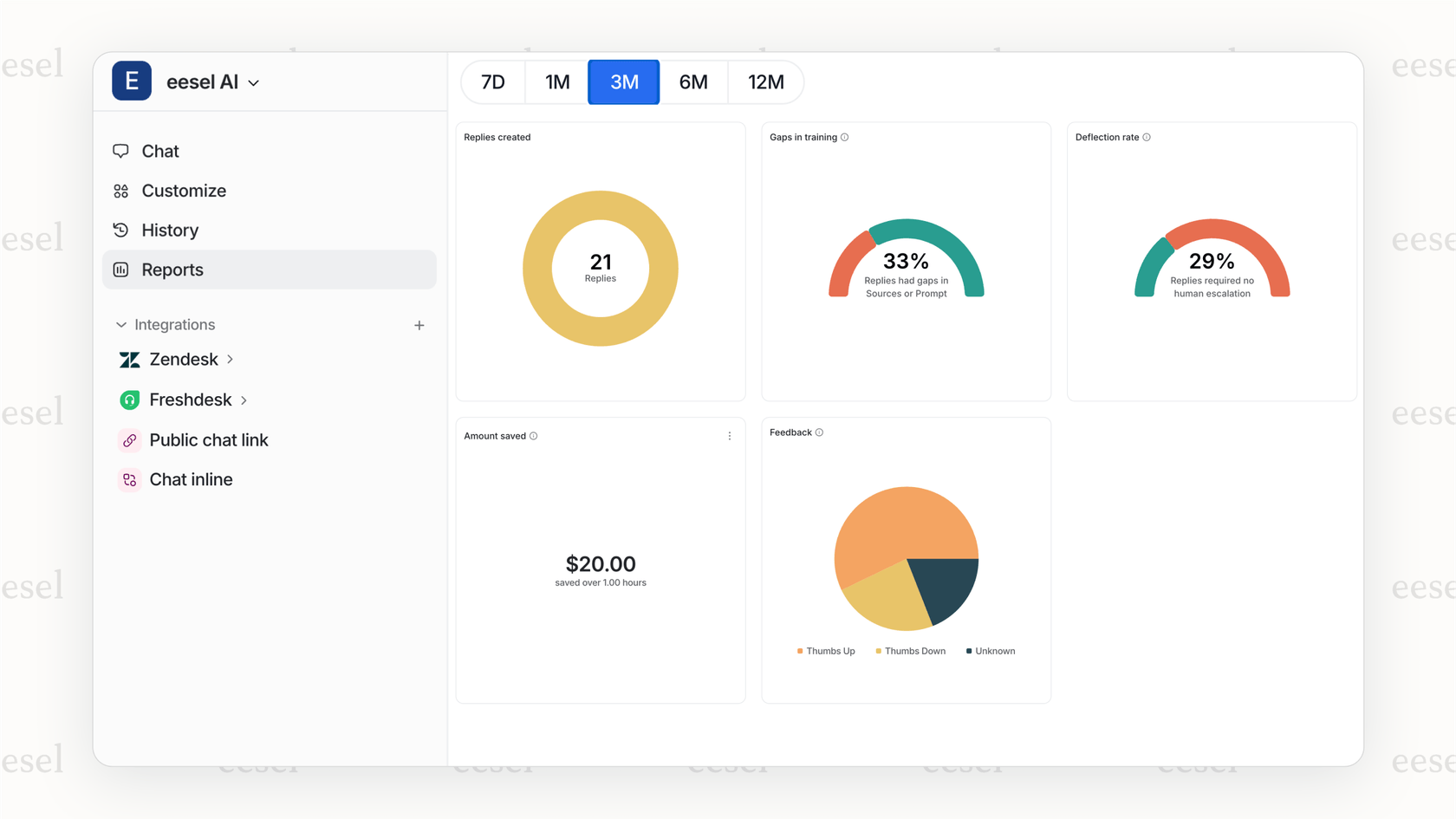
Pros: It works with the tools you already have, so you don't have to go through a big, disruptive switch. Because it learns from your actual business data, its answers are accurate and relevant. A really neat feature is the simulation, which lets you test how it would have performed on your past tickets to see the potential savings before you go live with customers.
Cons: The pricing is based on how much you use it, so you'll need to keep an eye on your usage as you grow. But this is often more cost-effective than plans that charge per person, especially if not everyone on your team is using the AI features.
Pricing: The Team plan starts at $239/month (billed annually) and includes up to 1,000 AI interactions.
Why we chose it: It tackles one of the biggest time-sinks for any small business: repetitive questions from customers and employees. By automating support and centralizing knowledge, it frees up your team for more important work without causing a major operational headache.
2. Jasper: AI for small business for marketing and sales content
Jasper is an AI content platform built to help teams create marketing copy, blog posts, social media updates, and sales emails faster. It gives you a large library of templates and workflows for specific marketing tasks, whether you need to write a Facebook ad or a new blog post.
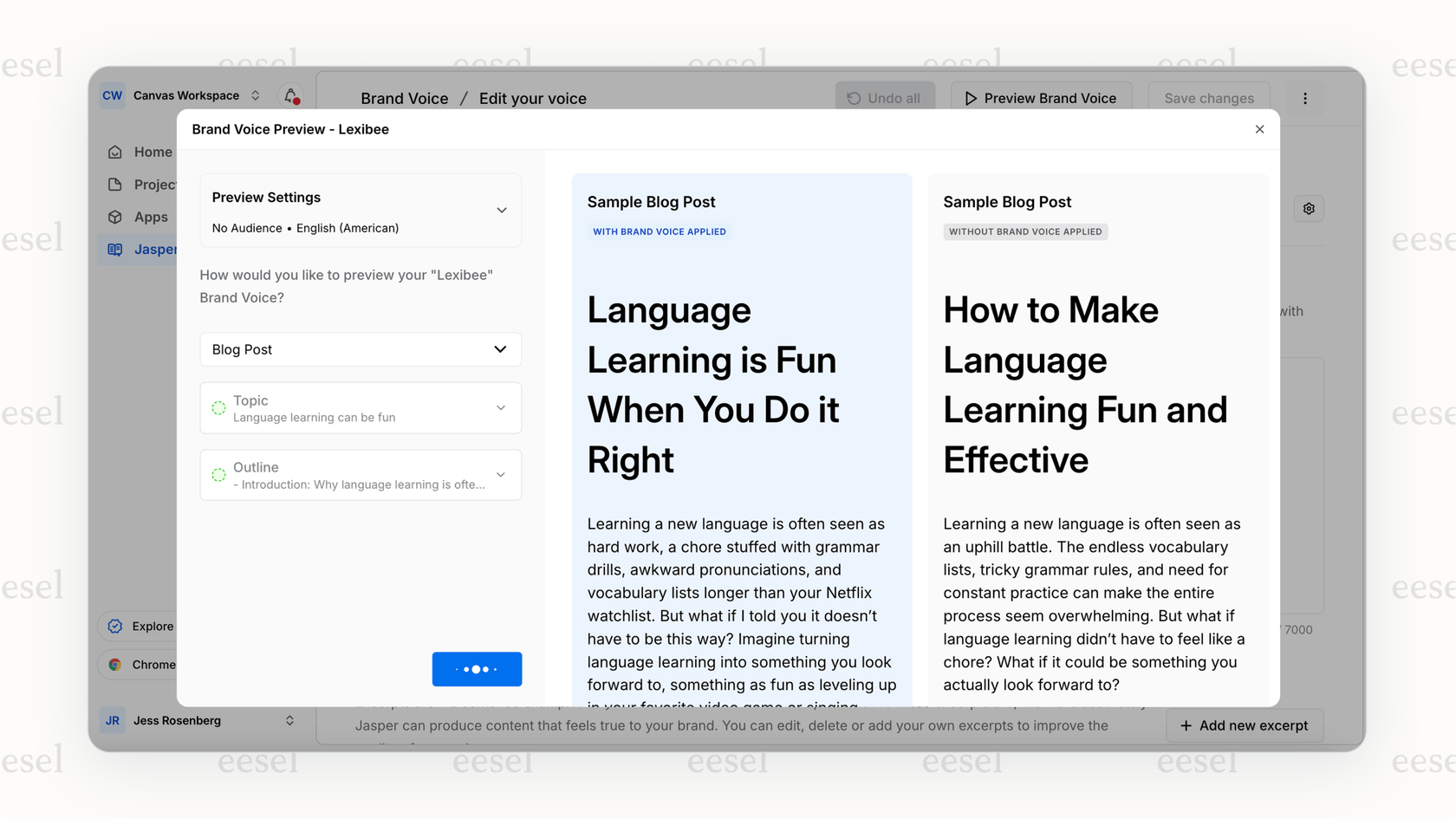
Pros: It’s great for getting past writer's block and generating lots of ideas quickly. The "Brand Voice" feature helps keep your content consistent, even with different writers.
Cons: The content can sometimes come out a bit generic and needs a human touch to sound like your brand. If you lean on it too much, your marketing might start to sound like everyone else's.
Pricing: The Creator plan starts at $39/month when billed annually.
Why we chose it: Creating content is a constant need for small businesses. Jasper offers a user-friendly way to scale your marketing efforts without hiring a whole team of writers.
3. Canva Magic Studio: AI for small business for easy graphic and video design
Canva's Magic Studio adds a bunch of AI tools to its very popular design platform. You can use it to generate images from a text prompt, create entire presentations from a single topic, edit videos, and design branded documents with a few clicks.
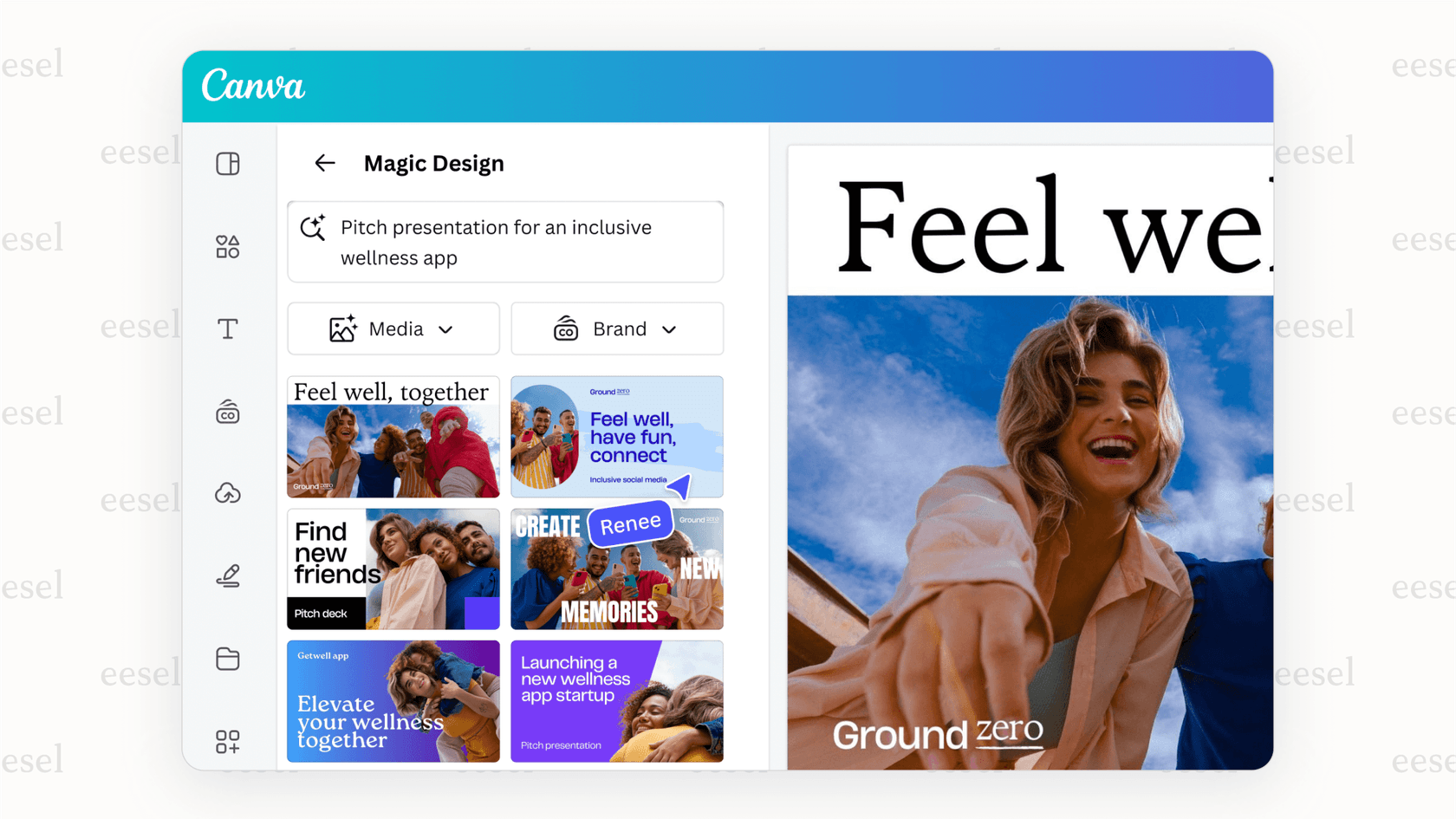
Pros: It's very easy to use for non-designers. Since many small businesses already use Canva for basic graphics, the AI tools fit right into a familiar workflow.
Cons: The AI-generated designs are a good starting point but can sometimes look a bit generic. You'll probably need to do some manual tweaking to make them match your brand perfectly.
Pricing: Many AI features are on the free plan. Canva Pro, which unlocks more features, starts at $119.99/year for one person.
Why we chose it: Professional-looking visuals are essential for marketing. Canva's AI tools open up design to everyone, making it possible for businesses without a designer to create great-looking assets.
4. Descript: Using AI for small business for simple video and podcast editing
Descript is a unique video and audio editor that works like a word doc. It uses AI to automatically transcribe your media, so you can edit your video or podcast just by editing the text. If you want to cut a section, you just delete the words. It also has AI tools for removing filler words like "um" and "uh," creating subtitles instantly, and even cloning your voice for quick fixes.
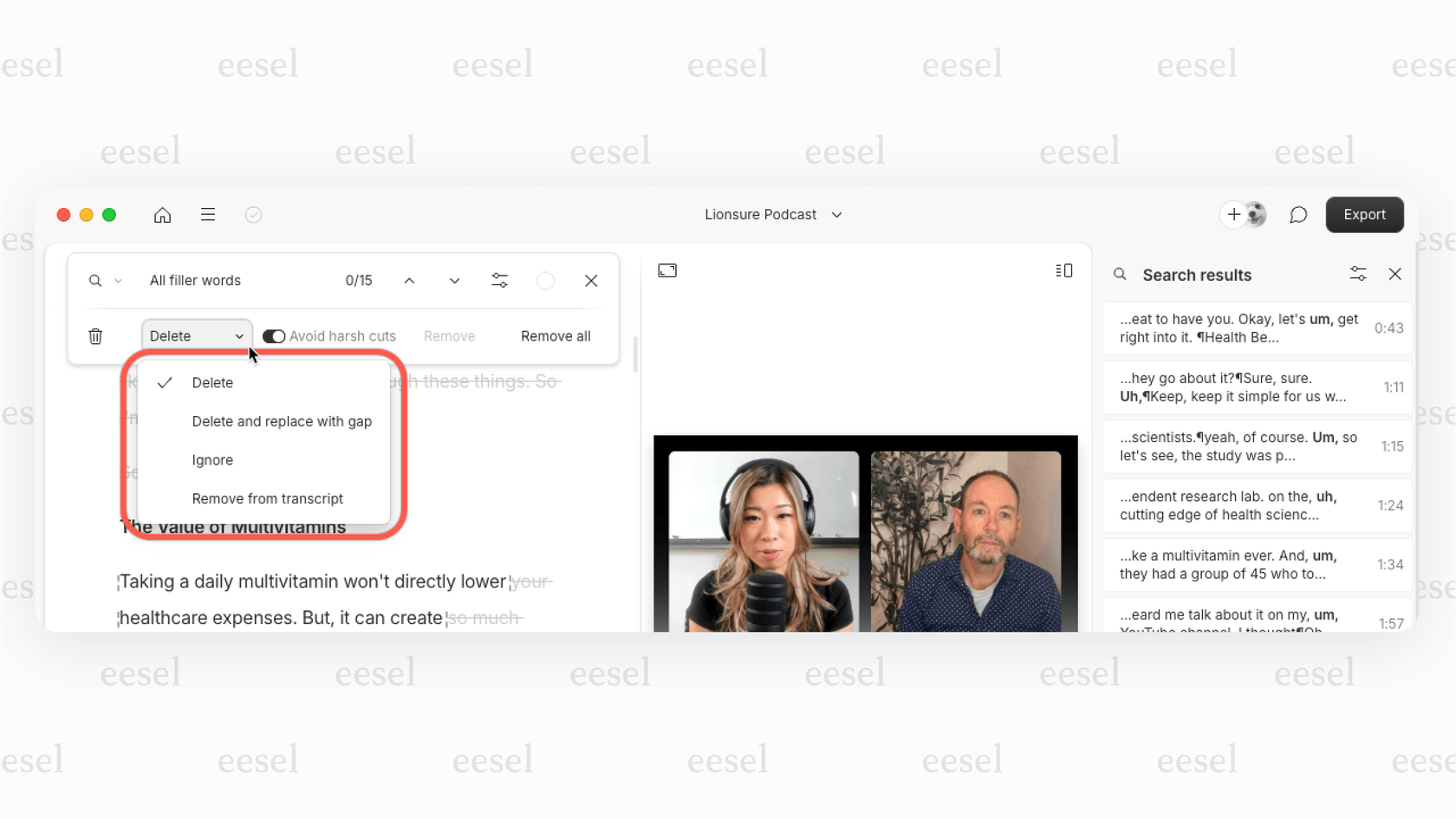
Pros: This makes video and podcast production much less intimidating. Editing from the text is super intuitive and fast, saving hours of work.
Cons: The AI voice cloning is useful for fixing a misspoken word but can sometimes sound a little robotic. You have to use it carefully to keep things sounding authentic.
Pricing: The Creator plan starts at just $12/month when billed annually.
Why we chose it: Video and audio are great for connecting with your audience. Descript makes producing high-quality content accessible and affordable for any small business.
5. Notion AI: Organizing knowledge and projects with AI for small business
Notion AI is an assistant built directly into the Notion workspace. It can summarize meeting notes, draft content, create tables, and find answers within your documents. It works as a helper for organizing company knowledge and managing projects.
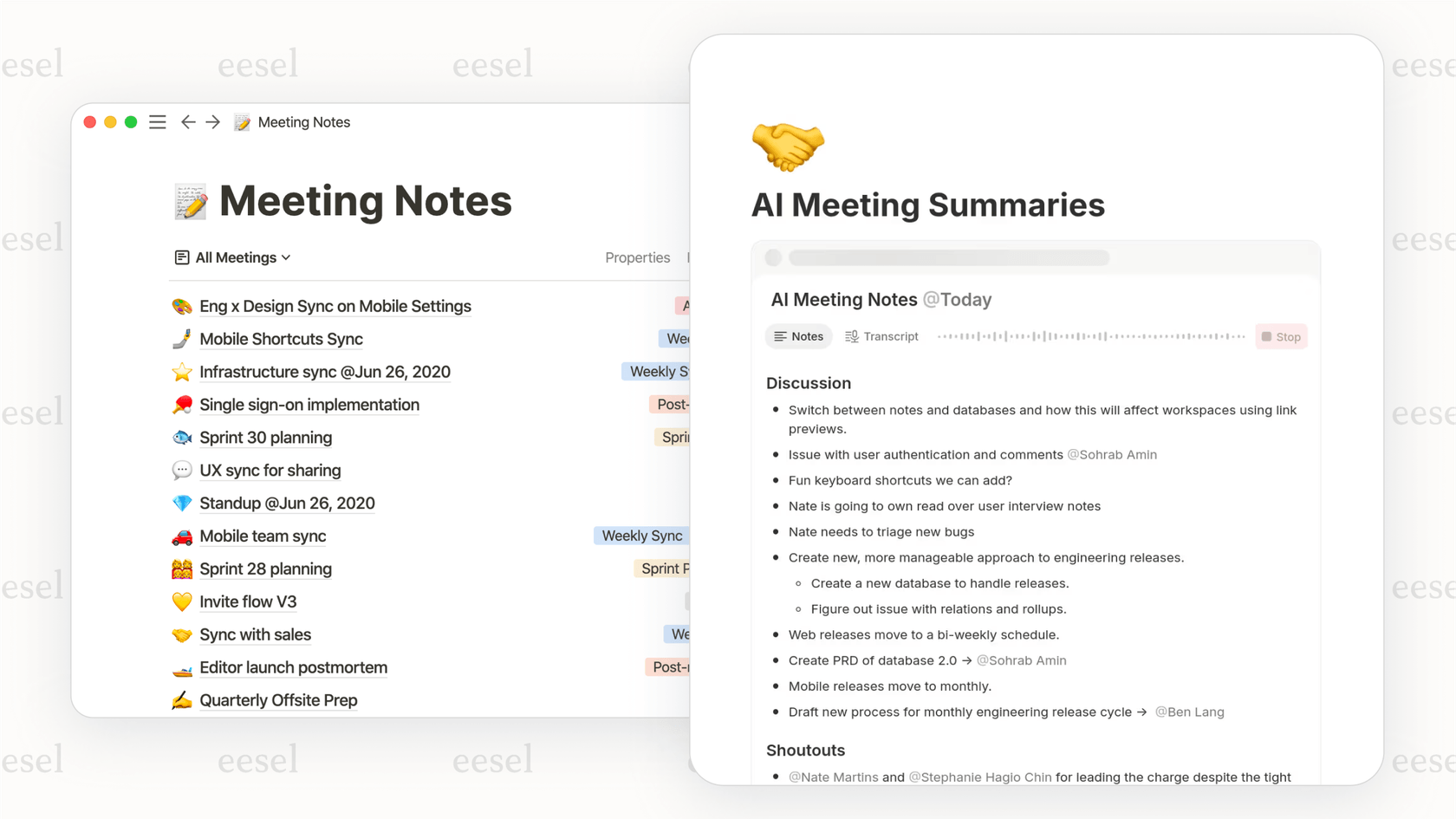
Pros: It’s built right into a tool that’s already great for organization. It's especially good for turning messy meeting notes into a clean summary with action items.
Cons: Its knowledge is stuck on the single page or database you’re looking at. That’s a big downside compared to a dedicated tool like eesel AI, which can search across your entire company's knowledge, no matter which app it's in.
Pricing: It's an $8/month (billed annually) add-on to any Notion plan, including their free one.
Why we chose it: It helps turn scattered notes and documents into structured, useful information, which is a big help for internal productivity.
6. Sage: AI for small business for automated accounting and cash flow
Sage is a long-standing accounting software that now uses AI to automate many tedious bookkeeping tasks. It can automatically categorize expenses, help process invoices, and speed up bank reconciliation. Its AI can also give you simple cash flow forecasts based on your past data.
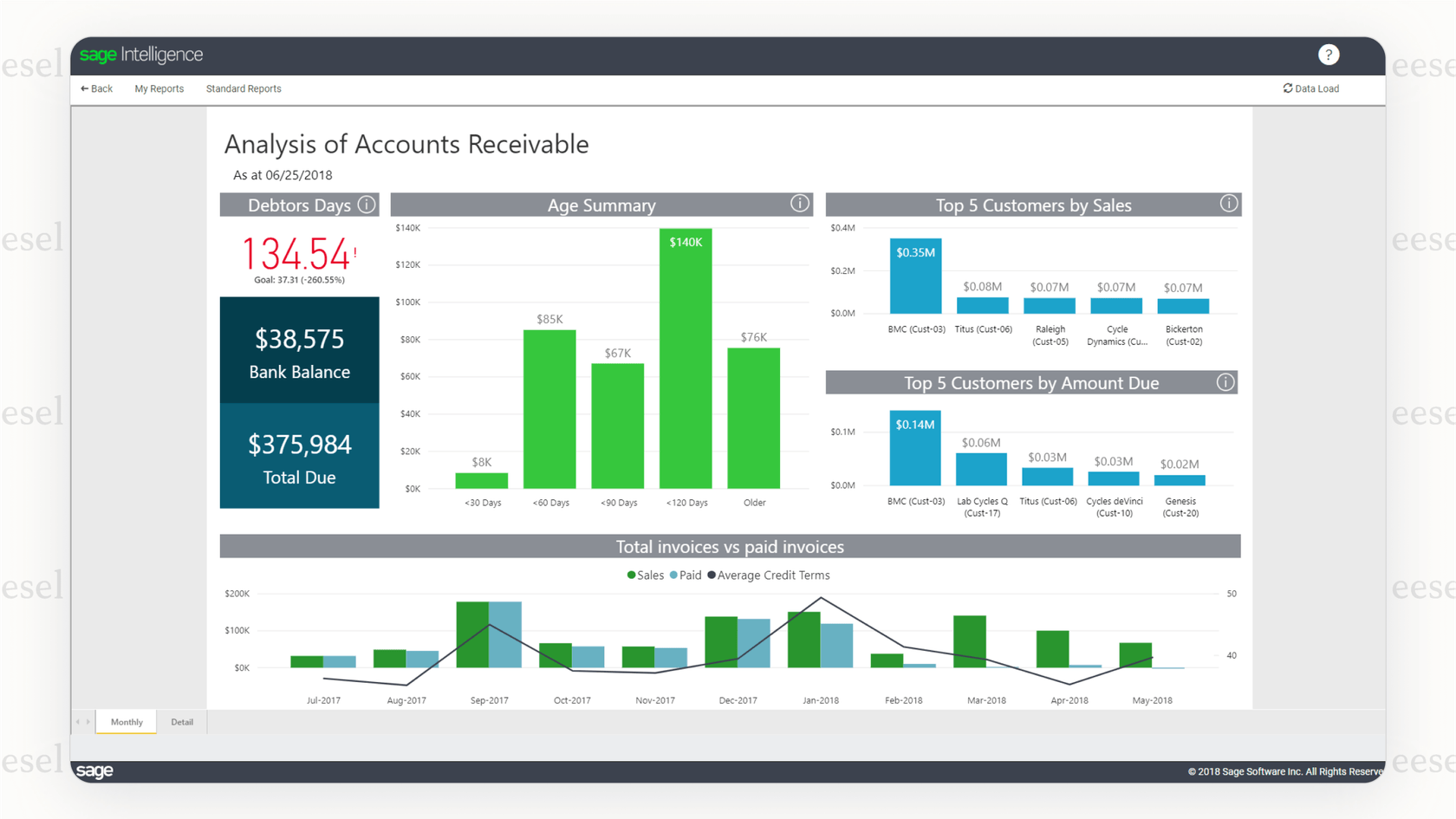
Pros: It saves a ton of time on manual data entry and other bookkeeping chores. The forecasting feature is a nice touch for financial planning.
Cons: The AI features are more for straightforward automation than for deep, creative insights. It's more of a workhorse than a strategic partner.
Pricing: Plans vary, but often start around $15/month.
Why we chose it: Managing finances is a non-negotiable part of running a business. Sage's AI makes a critical but time-consuming job more efficient and less prone to human error.
7. Buffer: Streamlined social media management with AI for small business
Buffer is a popular social media scheduling tool with an integrated AI Assistant. It can help you brainstorm post ideas, rewrite copy for different platforms (like LinkedIn versus Instagram), and repurpose old content, all inside your scheduling workflow.
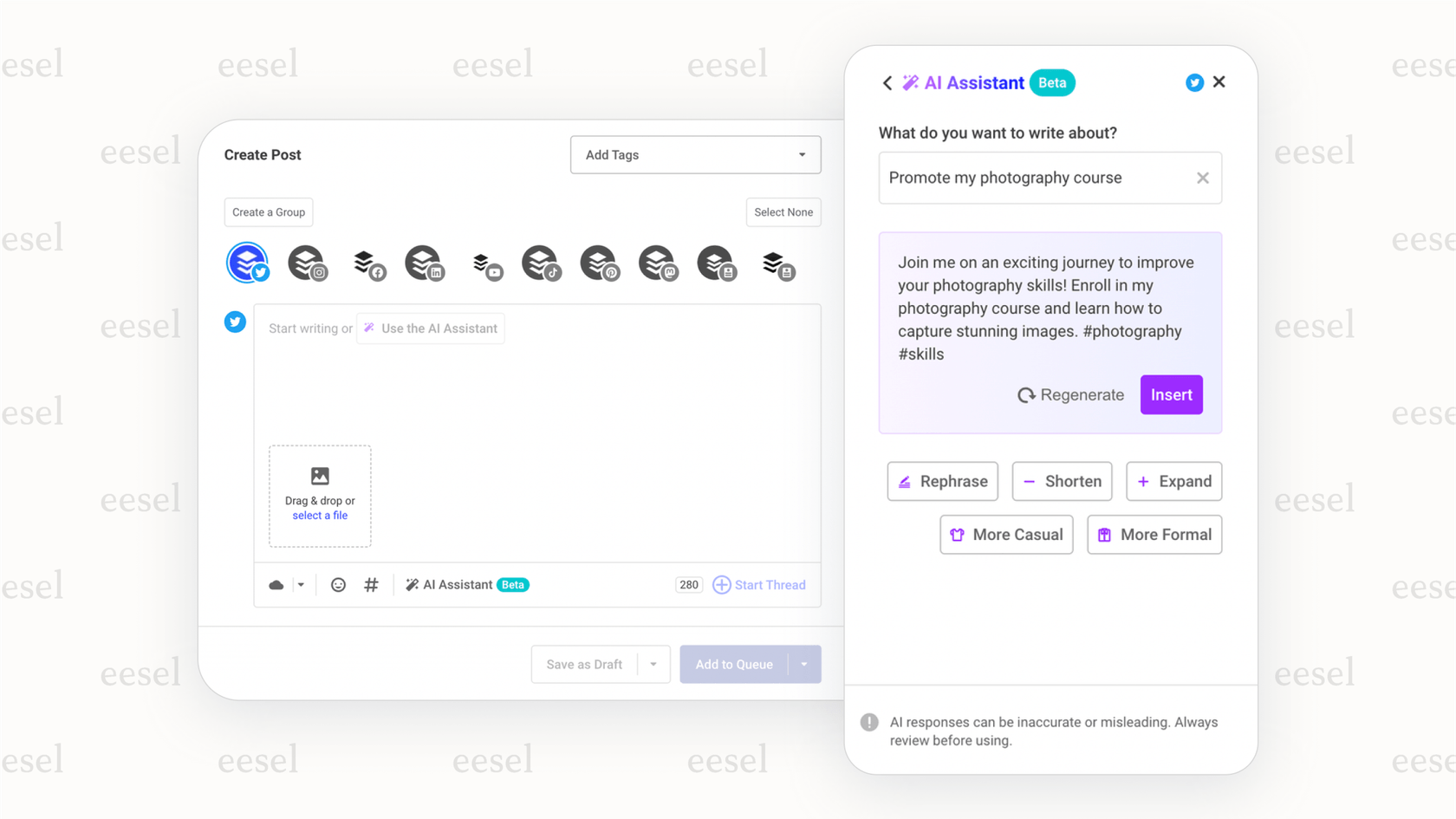
Pros: The AI Assistant is built right into the tool you use for scheduling, which saves you from jumping between apps. The free plan is generous and a great place for new businesses to start.
Cons: The AI-generated content can be a bit basic. It’s best used for brainstorming or a first draft, not a final, polished post.
Pricing: The Essentials plan starts at $6/month per channel.
Why we chose it: Keeping up with social media is a tough, time-consuming job. Buffer’s AI helps automate the creative part, so you don't run out of ideas.
8. Shopify Magic: Optimizing e-commerce with AI for small business
Shopify Magic is a set of AI tools built into the Shopify platform. It can write product descriptions, generate email copy for marketing, suggest personalized products to shoppers, and offer business insights through an AI assistant called Sidekick.
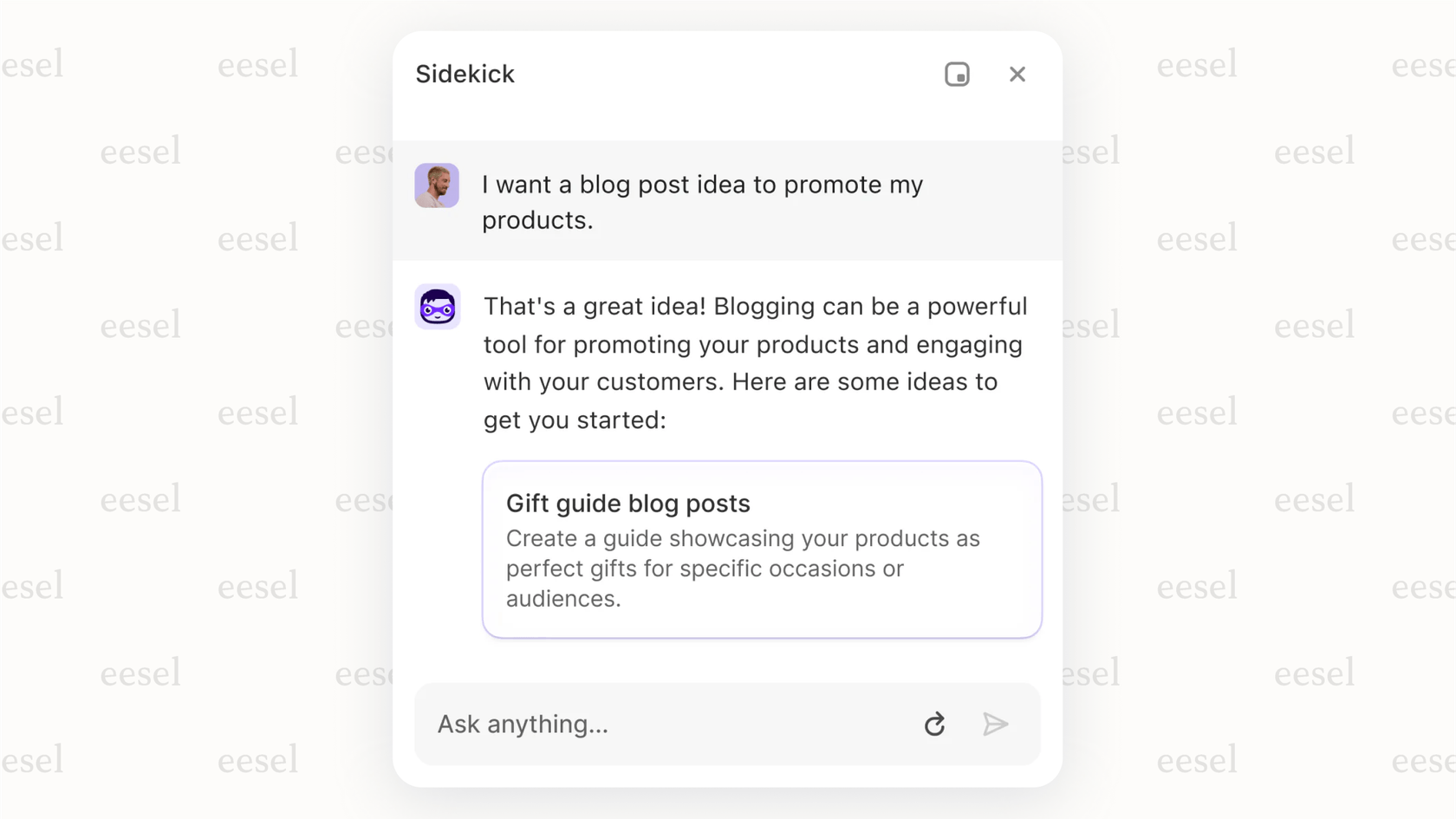
Pros: It’s perfectly set up for e-commerce, so it understands your products, customers, and orders. Sidekick is especially helpful because you can ask it questions in plain English, like "What were my top-selling products last month?"
Cons: It's only available if your business uses the Shopify platform.
Pricing: Shopify Magic is included with all paid Shopify plans, which start at $29/month.
Why we chose it: For any small business on Shopify, this tool is incredibly useful. It also works well with tools like eesel AI, which can connect to your Shopify catalog to give customers live, accurate product info in its support answers.
Tips for successfully implementing AI for small business
Adopting AI is more than just picking a tool; it's about fitting it into how you work. Here are four tips for a smooth rollout.
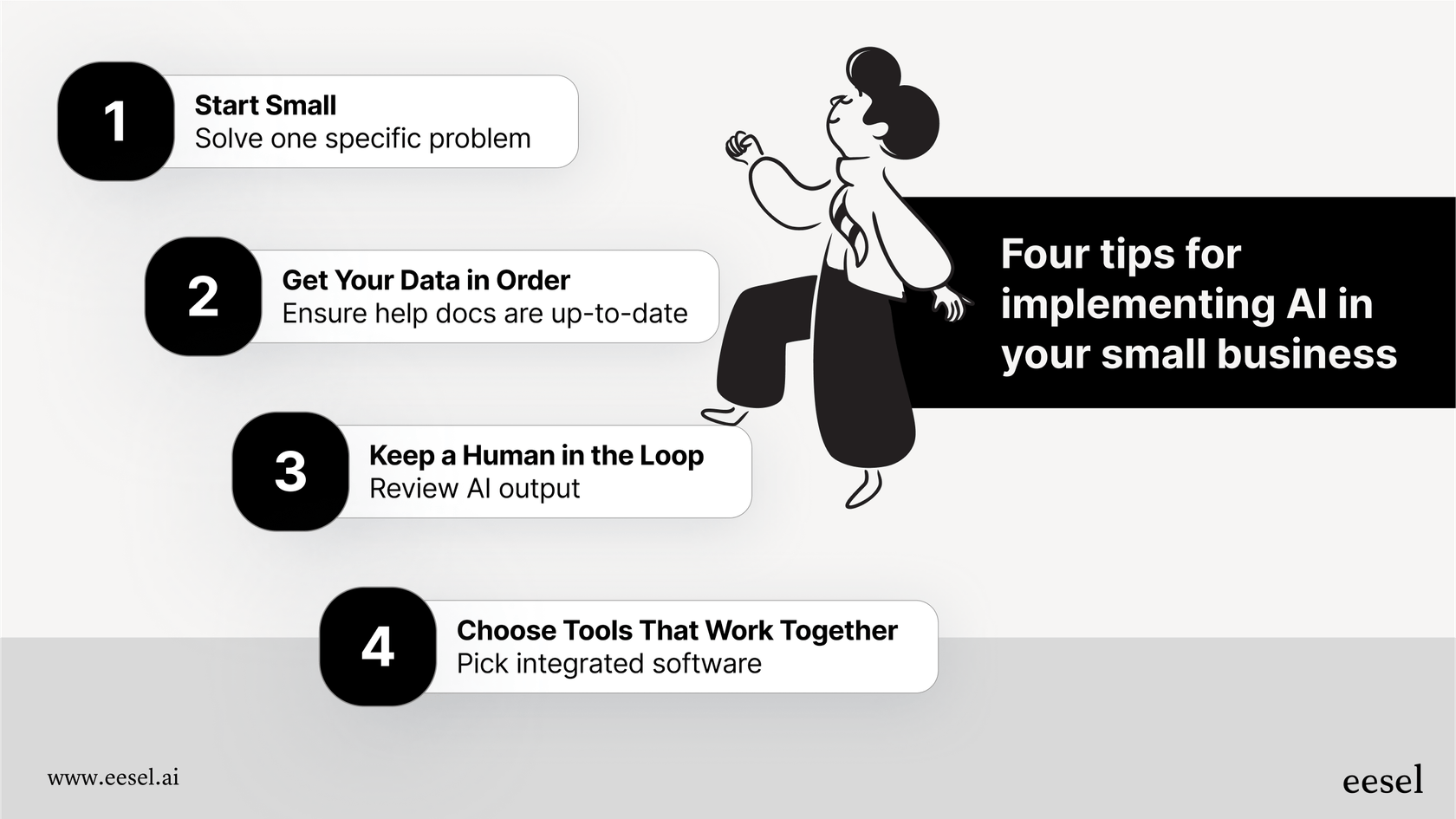
-
Start small and solve one problem. Don't try to automate everything at once you'll get overwhelmed. Instead, find your single biggest bottleneck. Is it answering the same support tickets over and over? Is it writing a weekly blog post? Pick one area and find a tool for that specific problem. A win in one area will give you the confidence to do more.
-
Get your data in order. AI tools, especially ones that learn from your business, are only as good as the data you give them. Before you launch an AI support agent like eesel AI, for example, spend some time making sure your help articles are up-to-date. Clean data leads to smart AI.
-
Keep a human in the loop. Think of AI as a helper for your team, not a replacement. Always have a human review AI-generated content before it goes live, check on automated responses, and make sure customers have an easy way to talk to a person if needed. This keeps your quality high and, more importantly, keeps customer trust.
-
Choose tools that work together. The goal of AI is to make your work easier, not to create new silos where information gets lost. Pick tools that can integrate. For example, an AI support agent that can pull information from your e-commerce platform and your internal wiki is much more useful than one that can't.
Can AI for small business really handle customer service?
Yes, especially for frontline support. AI agents like eesel AI's AI agent can instantly answer common questions like "Where is my order?", resolve simple issues, and pass more complex tickets to the right human agent. This gives your customers 24/7 support and reduces the number of tickets your team has to handle.
Get started with AI for small business today
AI is ready for small businesses, and it’s more accessible and practical than you might think. From writing emails to handling customer support, the right tools can give you a real edge and free you up to focus on growing your business.
The trick isn't just to use a few tools here and there, but to get them working together as a smart system. If your biggest time drain is answering the same questions from customers and employees, start there. An AI tool like eesel AI connects to the knowledge you already have to provide instant, accurate answers, letting your team focus on what's most important.
Book a Demo or start a free trial to see how eesel AI can help you improve your bottom line.
Frequently asked questions
Not at all. Many powerful tools offer affordable starting plans or even free trials, so you can see the value first. The key is to focus on the return on investment if a tool saves your team hours of manual work, it quickly pays for itself.
No, most modern tools are designed for business users, not engineers. They feature intuitive interfaces and simple setup processes, allowing you to get started quickly without needing to write any code or have a deep technical background.
Frame it as a collaboration tool that handles repetitive tasks, freeing them up for more valuable and engaging work. Start with a tool that solves a clear pain point for them, so they can experience the benefits firsthand and see it as a helpful assistant.
The biggest priority is to maintain human oversight, especially for content or customer interactions. Always review AI-generated output for accuracy and tone to ensure it aligns with your brand's standards and avoids potential errors.
A great practical use is automating frontline customer support. AI can instantly answer common questions about orders, policies, or product features 24/7, which dramatically reduces your team's ticket volume and improves customer satisfaction.
Start by identifying one specific, recurring problem in your workflow, like creating social media content or managing support tickets. Then, look for a tool specifically designed to solve that single problem instead of trying to find one solution for everything at once.
Share this post

Article by
Stevia Putri
Stevia Putri is a marketing generalist at eesel AI, where she helps turn powerful AI tools into stories that resonate. She’s driven by curiosity, clarity, and the human side of technology.






